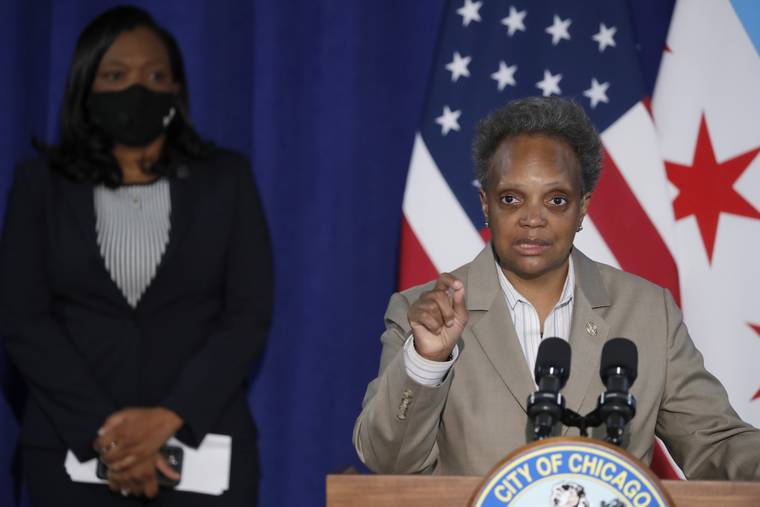CHICAGO — Chicago’s mayor on Wednesday announced that the nation’s third-largest school district will not welcome students back to the classroom to start the school year, and will instead rely on remote instruction.
The city’s decision to abandon its plan to have students attend in-person classes for two days a week once the fall semester starts Sept. 8 followed strong pushback from the powerful union representing Chicago teachers and as districts nationwide struggle with how to teach their children during the coronavirus pandemic.
When Chicago officials announced their hybrid-learning plan last month, they said it was subject to change depending on families’ feedback and data tracking the spread of the coronavirus. On Wednesday, Mayor Lori Lightfoot attributed the change in plans to a recent uptick in confirmed cases of COVID-19 in the city.
“The decision to start remotely makes sense for a district of CPS’ size and diversity,” Lightfoot said at a City Hall news conference. “But we also understand the struggle this will be for many of our parents who have to manage work, child care and all the other needs at home.”
Under the district’s original plan, parents were allowed to opt out of in-person instruction but had to decide by Friday.
A survey showed that 41% of the parents of elementary school students and 38% of the parents of high school students didn’t plan to send their children back to the classroom this fall, the district said in a news release. About 80% of Black and Latino families said they wouldn’t send their kids back for in-person instruction.
Katrina Adams, whose oldest daughter, Infinity, is about to begin fourth grade at a school on the city’s South Side, said she was relieved by the district’s decision, but that she has mixed feelings.
“I wanted her to be with her teacher and among her peers but at the same time, I didn’t want to take a chance of her getting sick,” Adams said.
Adams, who works from home as a human resources consultant, said she feels better prepared for virtual learning than in the spring, when Infinity initially struggled with assignments and hourlong online classes were sometimes cut short.
“Parents are forced to get involved,” she said. “If you’re not, they may fall behind. They are still children and they need somebody to support them.”
Monica Espinoza, an organizer with the Logan Square Neighborhood Association and a mother of four, opposed the resumption of in-classroom instruction because she was worried about the health risks to her two elementary school-age children.
Espinoza said she and many parents in the Northwest Side neighborhood were relieved by the district’s reversal but they will push for improved virtual instruction this fall.
“Parents are more prepared to say this is what we need and work with teachers,” Espinoza said.
Dr. Allison Arwady, the commissioner of the city’s Department of Public Health, said the average number of new confirmed cases and the rate of positive tests has risen in the past month. Officials said they will reassess the situation this fall and decide whether in-person classes will be possible in the second quarter of the school year.
Arwady said Chicago can use the start of the school year to learn from other districts that are moving forward with some in-classroom instruction, particularly those in areas where spread of the virus is better controlled.
“I would like everyone in Chicago to take this opportunity to think again about if there are things that you personally could do to turn our curve the other way,” Arwady said.
The Chicago Teachers Union firmly opposed the district’s hybrid proposal and called for virtual-only instruction to start the year. Union officials said it wasn’t possible to keep staff and more than 300,000 students safe in hundreds of schools around the city. It took preliminary steps toward a members’ strike vote if the district’s proposal for in-person instruction went forward.
The union’s president, Jesse Sharkey, tweeted Tuesday night as rumors of the shift circulated: “A win for teachers, students and parents. It’s sad that we have to strike or threaten to strike to be heard, but when we fight we win!”
Lightfoot said the union’s position didn’t force the city’s hand. She said the data on confirmed coronavirus cases changed during the past month.
The Illinois Federation of Teachers on Wednesday said other districts should follow Chicago’s lead.
Wednesday was the 15th straight day that the health department reported new infections topped 1,000 statewide. Illinois had 1,759 confirmed new cases.
Dr. Ngoze Ezike, the state’s public health director, pleaded for residents to wear face coverings in public and maintain 6 feet of separation.
“This is not about trying to take away people’s freedom. It’s about stopping the spread of a deadly virus,” Ezike said. “You’re tired of hearing it. I’m tired of talking about it … But this virus is not tired. In fact, it’s trying to gain momentum.”
Gov. J.B. Pritzker, a Democrat, would not comment on Chicago’s decision, noting that state education officials, local administrators and teachers unions worked together to develop guidance for district leaders, but that final decisions were being made locally.
Other major districts have taken similar action. The Los Angeles Unified School District decided against reopening later this month for in-person learning. New York City has announced a plan to do hybrid instruction, where students would be in school buildings in small groups on some days of the week but would learn remotely from home on other days. New York’s governor has yet to approve the plan.
———
This story was updated to correct that New York City has announced a school reopening plan that would mix in-person and online instruction.
———
Associated Press political writer John O’Connor contributed from Springfield, Ill.


